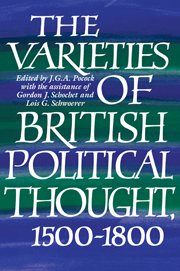Book contents
- Frontmatter
- Contents
- Acknowledgements
- Editorial introduction
- Part I Church, court and counsel
- Part II Dissolution, restoration and revolution
- Part III Commerce, empire and history
- 7 Politics and politeness in the reigns of Anne and the early Hanoverians
- 8 Political thought in the English-speaking Atlantic, 1760–1790: (i) The imperial crisis
- 9 Political thought in the English-speaking Atlantic, 1760–1790: (ii) Empire, revolution and an end of early modernity
- Epilogue
- Index
9 - Political thought in the English-speaking Atlantic, 1760–1790: (ii) Empire, revolution and an end of early modernity
Published online by Cambridge University Press: 04 August 2010
- Frontmatter
- Contents
- Acknowledgements
- Editorial introduction
- Part I Church, court and counsel
- Part II Dissolution, restoration and revolution
- Part III Commerce, empire and history
- 7 Politics and politeness in the reigns of Anne and the early Hanoverians
- 8 Political thought in the English-speaking Atlantic, 1760–1790: (i) The imperial crisis
- 9 Political thought in the English-speaking Atlantic, 1760–1790: (ii) Empire, revolution and an end of early modernity
- Epilogue
- Index
Summary
The preceding chapter began with an apologia for commencing its narrative about the time of George Ill's accession. This chapter, the last in the historical series constituting the volume, must conclude with an apologia for breaking off the narrative at about the midpoint of his reign, instead of carrying it on to the end of his successor's, on the grounds that historical events – including events in the history of political discourse – occurring about the outbreak of war with revolutionary France, increasingly belong to a history shaped by forces other than those which have been invoked in holding this volume together. The themes to be treated are: the recovery of imperial monarchy from the shock of the American crisis, accompanied by the final exit of the United States from the history of British discourse into a discourse and a history of their own; the British response to the revolution in France and the circumstances attending the twenty years of war which followed; and the case for positing an ‘end of early modernity’ at the outset of this period. The organising concepts will continue to be the history of the order laid down in English church and state by the Tudors, and the implications of the Scottish accession to this order and the American departure from it; but the order will be depicted as existing in a world even more remote from that in which it was first created than was the world brought into being during William Ill's reign, and diminishingly governed by that world's organizing concepts.
- Type
- Chapter
- Information
- The Varieties of British Political Thought, 1500–1800 , pp. 283 - 318Publisher: Cambridge University PressPrint publication year: 1994
- 1
- Cited by



